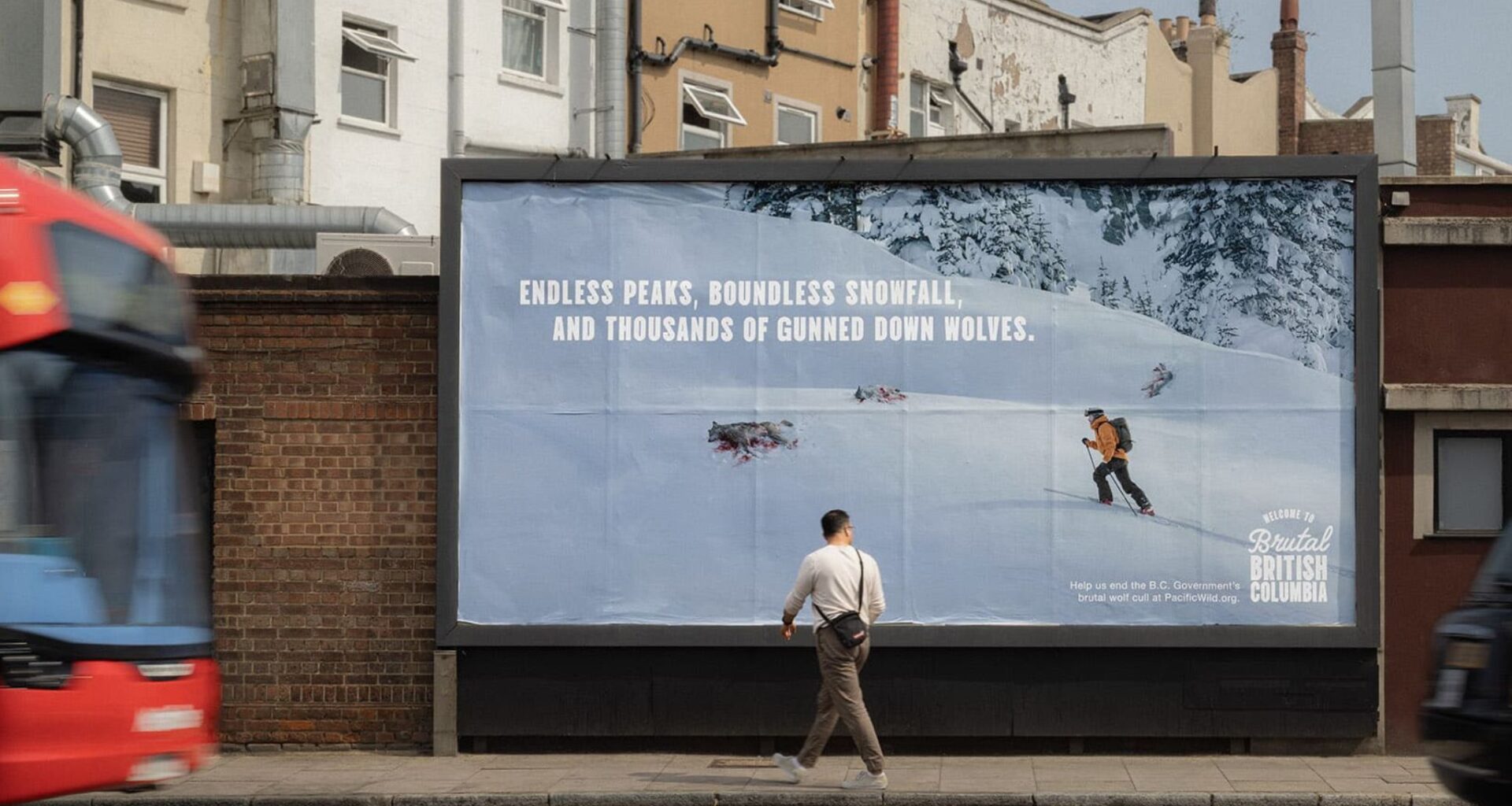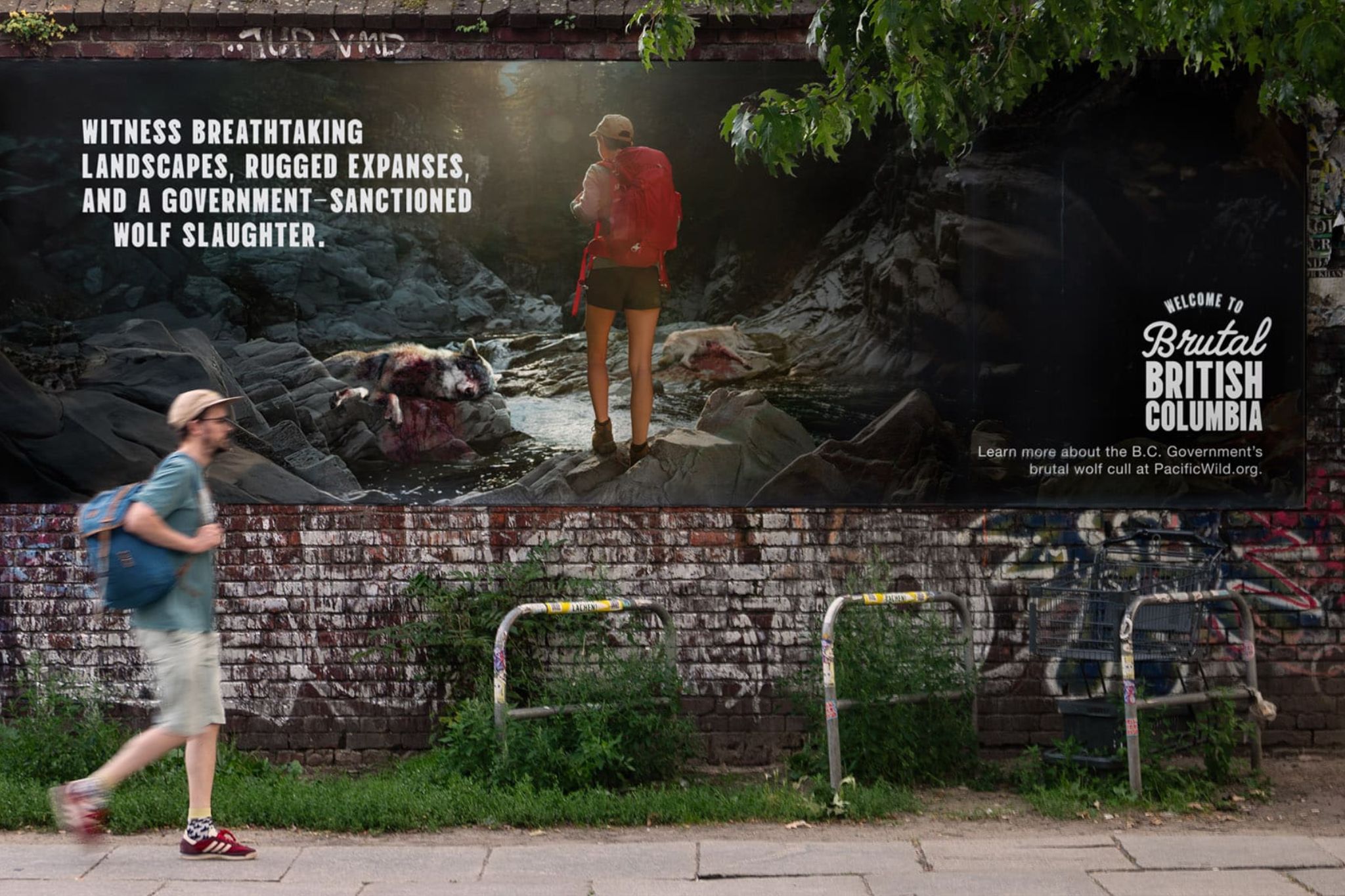Tourists in downtown Victoria likely thought they were walking into a typical souvenir shop earlier this month.
But instead of maple-leaf mugs and B.C. postcards, they were met with bloodstained tote bags, lifeless plush wolves, and stark displays.
The pop-up was part of Pacific Wild’s Brutal British Columbia campaign, a bold initiative launched Aug. 1 in collaboration with Vancouver agency ONE23WEST.
The goal was to shift the narrative on the province’s glossy “Beautiful British Columbia” brand and draw attention to what campaigners call a “brutal secret.”
“Our goal was to flip the province’s glossy tourism brand on its head,” said Natasha Wehn, project director at Pacific Wild, in a media release.
“People come here for wilderness and wildlife, but behind the marketing is a different story.”
The campaign has since gone global.
On International Wolf Day (Aug. 13), Pacific Wild rolled out billboards in London and Berlin that paired postcard-perfect B.C. landscapes with stark images of wolves shot from helicopters.
The group also premiered a short film on the lawn of the B.C. Legislature in Victoria, capturing shocked visitor reactions to the souvenir shop.
“We’re not asking anyone to turn away from B.C. — we’re asking them to speak up for it, because what’s at stake is too important to ignore,” Wehn said in the campaign’s launch video on YouTube.
“Over the past decade, we’ve delivered more than 500,000 signatures to the Legislature calling for an end to the wolf cull. We’ve met with decision-makers, pursued legal action, and pushed for transparency and long-term solutions. Still, the killing continues.”
The wolf cull
Since 2015, more than 2,100 wolves have been shot from helicopters under the province’s predator reduction program, which has cost taxpayers over $10 million, according to the Pacific Wild website.
Conservation advisor Ian McAllister called the program “a war on wolves throughout most of British Columbia.”
“Over this 10-year period, over 2,500 wolves have now been killed, mostly by helicopter, at the cost of over $11 million taxpayer dollars,” he told Daily Hive.
“The B.C. government appears to have no end in sight. They want to just keep killing wolves until there are no wolves left in the Interior… and it’s simply not working.”
The cull was launched to protect endangered caribou herds, but critics argue it misses the point.
Habitat loss from logging, mining, oil and gas development, and recreation like heli-skiing has pushed caribou to the brink.
McAllister said blaming wolves is both unscientific and unethical.
“We fundamentally disagree that killing wolves is going to save caribou,” he said.
“The research does not support it, and in the absence of protecting caribou habitat, it’s immoral to be killing a species in such a cruel way. Wolves are simply being scapegoated for government negligence.”
A 2020 study even found over 900 square kilometres of critical caribou habitat had been logged since 2014, despite the cull.
Animal welfare concerns have also drawn criticism, with wolves often chased to exhaustion in deep snow and sometimes left wounded.
This image, provided by Pacific Wild, documents the aftermath of B.C.’s aerial wolf cull, where wolves are chased by helicopter and shot in deep snow. Since 2015, over 2,500 wolves have been killed as part of the province’s predator reduction program, which critics argue ignores the root cause of caribou decline: habitat loss. (Freedom of Information/pacificwild.org)
“They certainly are not a risk to humans,” McAllister told Daily Hive.
“The government just fundamentally doesn’t understand the important role wolves play in ecosystem management. Wolves are absolutely essential. They’ve co-evolved with caribou and other species for millennia, maintaining predator-prey balance. Instead of respecting that, they’re spending millions of dollars using helicopters to kill wolves under the guise of caribou management.”
The program has even used “Judas wolves,” collared animals spared to lead hunters back to their packs.
McAllister said Pacific Wild is now urging the province to account for the program’s failures.
“We’re asking the government to conduct an independent audit of the wolf cull,” he said.
“If independent biologists reviewed the program, they would recommend it ends tomorrow. It’s damaging British Columbia’s international reputation and has no scientific support.”
Growing support
The Brutal B.C. campaign has attracted backing from Indigenous leaders and eco-tourism operators.
The Union of B.C. Indian Chiefs described wolves as “relatives, revered as sacred,” adding, “We have coexisted with wolves for millennia and they are deeply entrenched in our lifeways and belief systems; they are part of our ceremonies, regalia, and stories. Wolves are also a keystone species whose demise creates imbalance that ripples across critical ecosystems.”
A Pacific Wild billboard in Berlin confronts viewers with the message, “Witness breathtaking landscapes, rugged expanses, and a government-sanctioned wolf slaughter.” (Pacific Wild/pacificwild.org)
Tourism operators echoed the concern that the wolf cull threatens not only wildlife but the province’s global reputation.
“People come to British Columbia for the raw, untamed beauty of its wild places,” said Colin Griffinson, owner of Pacific Yellowfin Charter, in the news release.
“After decades of guiding visitors along this coast, I’ve seen firsthand how essential wolves and other wildlife are to the magic of this place. This cull isn’t just a tragedy for the animals — it’s a threat to the identity and economy of our province.”
Tourism brought in $22 billion in 2023 and supported more than 125,000 jobs.
Campaigners argue that allowing wolves to be gunned down while logging continues in caribou habitat not only puts wildlife at risk, but also damages B.C.’s reputation abroad.
For Pacific Wild, the goal is to end the wolf cull and protect the wild places that make British Columbia what it is.
Pacific Wild asks those who wish to take action to visit its website for resources or contact Premier David Eby’s office directly at 250-387-1715.
Want to stay on top of all things Vancouver? Follow us on X



